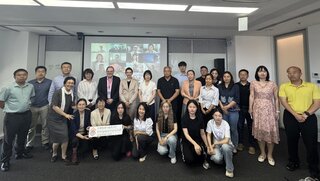Sino-German Exchange on Energy Meteorology: Enhancing Forecasting for a Resilient Energy Transition

Beijing, 4 June 2025 – The Sino-German Workshop on Energy Meteorology, jointly hosted by GIZ and the National Key Laboratory of Renewable Energy Grid Integration, brought together leading experts from China and Germany to explore how meteorological science can better support the green and low-carbon transition of energy systems. The event marked the first dedicated dialogue on energy meteorology under the Sino-German Energy Partnership framework and laid the groundwork for deeper bilateral cooperation in this emerging and strategic field.
Background: Why Energy Meteorology Matters
Energy meteorology plays an important role enabling a reliable, efficient, and climate-resilient energy transition. As the world increasingly relies on renewable energy sources such as wind and solar, understanding and predicting weather and climate patterns has become essential for optimizing energy production, ensuring grid integration, and supporting long-term planning. Energy meteorology provides the scientific foundation not only for assessing renewable energy potential and forecasting variability, but also for managing the risks associated with climate-related uncertainties and extreme events.
Both Germany and China are actively advancing energy meteorology through research, digitalization, and practical application. Strengthening collaboration in this field will not only improve national energy resilience but also contribute to global efforts in combating climate change.
Event Focus: Bridging Weather Science and Power System Operations
As the world moves toward more weather-dependent renewable energy sources, the integration of meteorological insights into energy planning and system operations becomes increasingly critical. The workshop addressed a wide range of key topics, among which:
- Advances in high-precision forecasting technologies for wind and solar power integration
- Data standardization and interoperability between meteorological and energy sectors
- Application of artificial intelligence to improve forecast accuracy and reduce system operation costs
- Impact of extreme weather events on energy system resilience and reliability

Representatives from leading institutions in Germany and China —including the Chinese Academy of Sciences, China Meteorological Administration, China Electric Power Research Institute, German Weather Service, Fraunhofer IEE, and the European Centre for Medium-Range Weather Forecasts—shared national experiences, research progress, and practical needs from both the meteorological and energy system perspectives.
Outlook: Deepening Bilateral Cooperation in Energy Meteorology
The workshop successfully opened a new chapter in Sino-German cooperation on energy meteorology. It fostered in-depth exchanges between the two countries on the integration of meteorology and power systems. Looking ahead, The Sino-German Energy Partnership will continue to follow innovative practices in energy meteorology from both sides, working closely with industry partners to jointly advance the energy transition and the achievement of green, low-carbon goals.